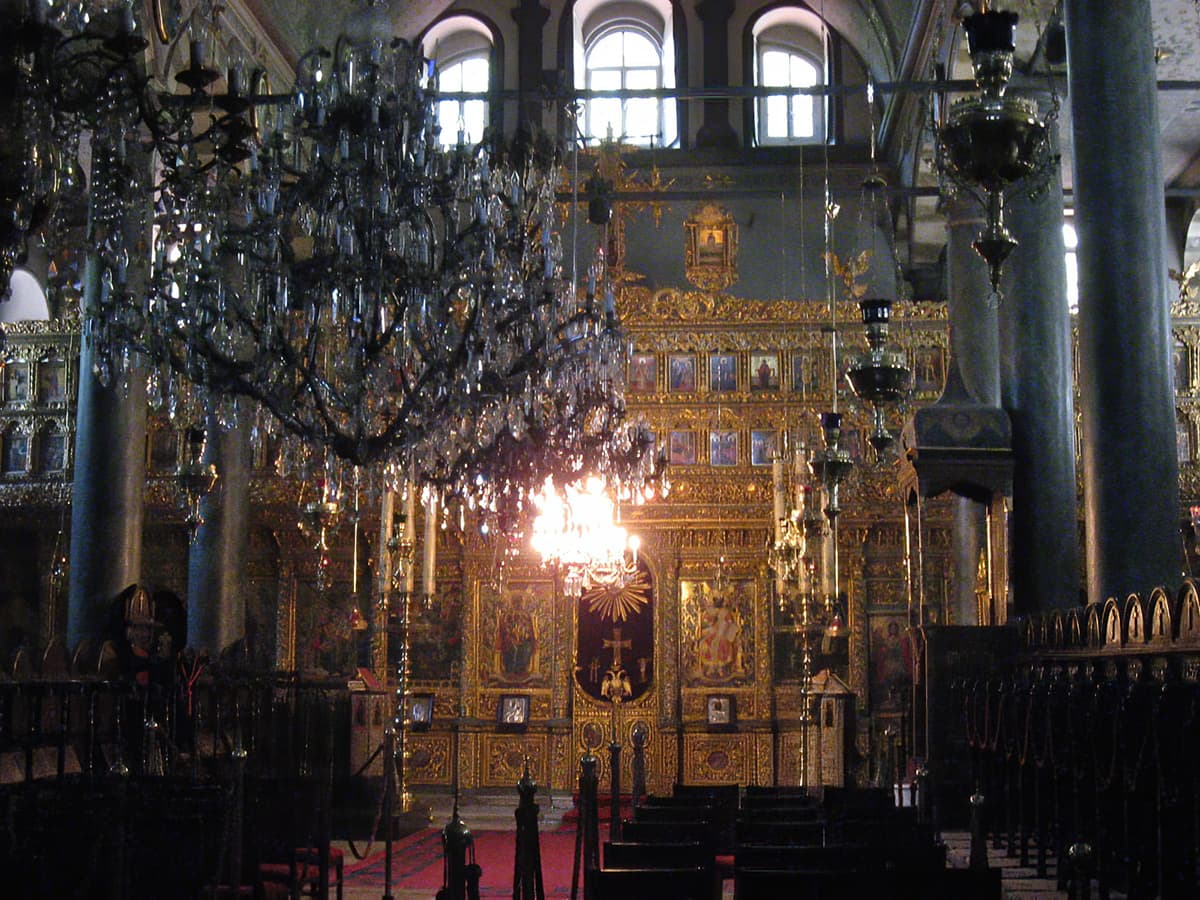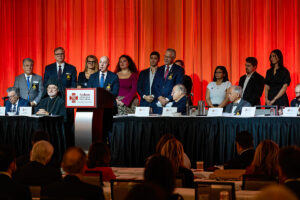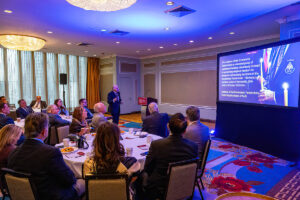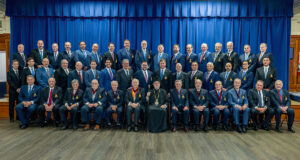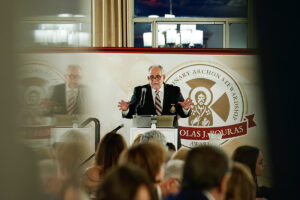The following article was written by Archon Evagelos Sotiropoulos, Archon Ostiarios, who recently returned from a trip to the Ecumenical Patriarchate and authored this short piece on his reflections. Archon Evagelos is the new President of the Archons of the Ecumenical Patriarchate in Canada and a long-time collaborator with the Archons of America.
Celebrating the Thronal Feast of the Ecumenical Patriarchate in Constantinople is a deeply insightful and spiritually rewarding experience.
I traveled to the Phanar for the feast of St. Andrew the First-called Apostle and came away with a refreshed, dare I say, hopeful, outlook.
I witnessed, firsthand, the magnetic force of the Ecumenical Patriarchate: but, by what power does the Patriarchate exert this force?
Is it through state-sponsored or supported activities and actions? Obviously not.
Is it through financial coercion or the buying of favours? Another no.
My experience teaches me that the magnetic force of the Ecumenical Patriarchate is powered by two main drivers: love and service.
The power of love combined by the dedication to service infuses the actions of the Phanar, which in turn draws people – both Orthodox and other – from around the world.
Before diving deeper into a few examples from my experience throughout the Thronal Feast, I think it prudent to pre-emptively address the accusation of a romanticized view of the Phanar.
Christ says that whoever desires to great must be servants (cf. Matthew 20:26).
St. John the Apostle and Theologian writes that God is love (cf. 1 John 4:15).
Are these not foundational pillars of the Christian life? To love, serve, and sacrifice for others, like Jesus Christ sacrificed Himself on the Cross for the salvation of all?
Some may say that this is proper and right in theory, but the twenty-first century reality of hard power, realpolitik and statecraft dictate otherwise.
Maybe so, but shall we not recall, again, the words of Jesus: “Render to Caesar the things that are Caesar’s, and to God the things that are God’s” (Mark 12:17).
In a turbulent world, what are Orthodox Christians, and indeed all people of goodwill, thirsting and longing for from spiritual leaders? Is it not love and sacrifice, like the Lord taught?
Love, that simple yet simultaneously incomprehensible phenomenon, is exemplified at the Phanar, and in particular through the person of His All-Holiness Ecumenical Patriarch Bartholomew.
His All-Holiness has given his life in service to the One, Holy, Catholic, and Apostolic Church, and has sacrificed much during his historic ministry and tenure as Ecumenical Patriarch.
The love he has for others, and the love and respect people have for him, was profound and plentiful during the Thronal Feast. And the love for him, and for the Ecumenical Patriarchate, was not only from Greek Orthodox, as some may surmise.
Moreover, through sacrifice and a sincere commitment to Christian (and non-Christian) collaboration, the Ecumenical Patriarchate finds itself uniquely situated at the vanguard for what is needed in today’s society: an openness to dialogue, the confidence to engage others without fear, and the steadfastness to hold firm on Church Traditions but always speaking the truth in love (cf. Ephesians 4:15).
These and other characteristics, such as its storied and unparalleled history, underscore the Ecumenical role and function of the Church of Constantinople.
If the Phanar ceased to exist, no other local church could ever replace it. It is not because the Holy Fathers through the Ecumenical Councils selected and affirmed the prominence of Constantinople, nor because it is New (not Second) Rome in no need of a Third, although both of these things are true, but because it is simply not in the DNA of others, as they say.
The Church of Constantinople, and the prominent personalities who have led it, including the current Patriarch, have endowed it with a non-ethnophyletism sense of universal engagement and growth, including the missionary efforts of Sts. Cyril and Methodius, to the global spiritual reach of Mount Athos – which derives its ecclesiastical existence from the Ecumenical Patriarchate – to the granting of autocephaly to all other local churches, save the Ancient Patriarchates (and Church of Cyprus).
This worldwide connection was evident at the Thronal Feast. Following a wonderful Great Vespers service, a Concert for Peace in honour of His All-Holiness, sponsored by the Benedictine Pannonhalma Archabbey, together with the Budapest Festival Orchestra, was held at the Galata School. The exquisite performers included an Iraqi born celloist who performed a moving rendition of an Arab folk song in honour of the Arab victims of the Middle East conflict. This was followed by a powerful violinist performance of a mourner’s Kaddish to remember the Jewish victims. Finally, a quartet performed a somber yet inspiring piece by a Ukrainian composer in memory of the innocent lives lost in the unprovoked and illegal invasion of that country. The Ecumenical Patriarch provided closing remarks in three languages, exemplifying the power of collaboration and dialogue.
The following morning, a synodal Divine Liturgy led by His All-Holiness was conducted at the Patriarchal Church of St. George the Trophy-bearer. The five-hour service seemed like five-minutes, as the incense filled the air, and the two choruses of chanters transported the believers in the overfilled church to the heavens.
The pews were filled with many non-Orthodox Christian leaders, including a delegation from the Vatican led by Cardinal Kurt Koch. The Church of St. George showcased not only the international character of the Ecumenical Patriarchate, but how love and sacrifice attracts people to a location that is not always welcoming to Christian or other minority faith leaders.
Notwithstanding this, people make the pilgrimage to the Queen of Cities: at the post-liturgical luncheon, the table I was at included people from various European countries, Bulgarian Orthodox from Constantinople, and a Catholic priest from the Congo.
The Patriarchate was a constant hub of visiting groups, as it is throughout the year. There is something about the Patriarchate that despite its humble character – or perhaps because of it – people flock to it as the Centre of Orthodoxy.
In an era where the actions of some local churches are leading to the unfortunate denominalization of global Orthodoxy (which is a topic for a different article), the Phanar stands firm in service to the Church and its unity, as it has for centuries.
Regardless of internal challenges and external threats, the Ecumenical Patriarchate persists, and the presence of young people, both lay and clergy, infuses it with a sense of hope.
Since the time of the First-called Apostle, Andrew, the Church of Constantinople has experienced countless trials and tribulations: its patriarchs have been hung and martyred; its institutions shuttered; its places of worship desecrated; its faithful attacked, expelled, and even killed. Yet, dispute these and other challenges, the Patriarchate – and especially this Patriarch – persist.
If this Thronal Feast is any indication, through the intercessions of St. Andrew, it always will, to the glory of God.
